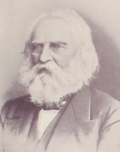The Bridge
by Henry Wadsworth Longfellow
I stood on the bridge at midnight,
As the clocks were striking the hour,
And the moon rose o'er the city,
Behind the dark church-tower.
I saw her bright reflection
In the waters under me,
Like a golden goblet falling
And sinking into the sea.
And far in the hazy distance
Of that lovely night in June,
The blaze of the flaming furnace
Gleamed redder than the moon.
Among the long, black rafters
The wavering shadows lay,
And the current that came from the ocean
Seemed to lift and bear them away;
As, sweeping and eddying through them,
Rose the belated tide,
And, streaming into the moonlight,
The sea-weed floated wide.
And like those waters rushing
Among the wooden piers,
A flood of thoughts came o'er me
That filled my eyes with tears.
How often, oh, how often,
In the days that had gone by,
I had stood on that bridge at midnight,
And gazed on that wave and sky!
How often, oh, how often,
I had wished that the ebbing tide
Would bear me away on its bosom
O'er the ocean wild and wide!
For my heart was hot and restless,
And my life was full of care,
And the burden laid upon me
Seemed greater than I could bear.
But now it has fallen from me,
It is buried in the sea;
And only the sorrow of others
Throws its shadow over me.
Yet whenever I cross the river,
On its bridge with wooden piers,
Like the odour of brine from the ocean
Comes the thought of other years.
And I think how many thousands
Of care-encumbered men,
Each bearing his burden of sorrow,
Have crossed the bridge since then!
I see the long procession
Still passing to and fro,
The young heart hot and restless,
And the old subdued and slow.
And for ever and for ever,
As long as the river flows,
As long as the heart has passions,
As long as life has woes;
The moon and its broken reflection
And its shadows shall appear,
As the symbol of love in heaven,
And its wavering image here.
Source:
Longfellow's Poetical WorksCopyright 1893
Henry Frowde, London
